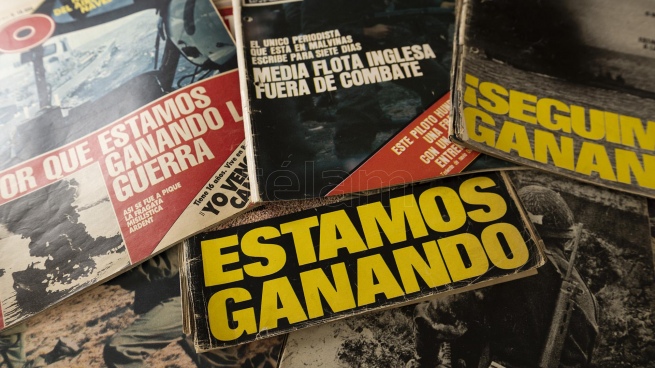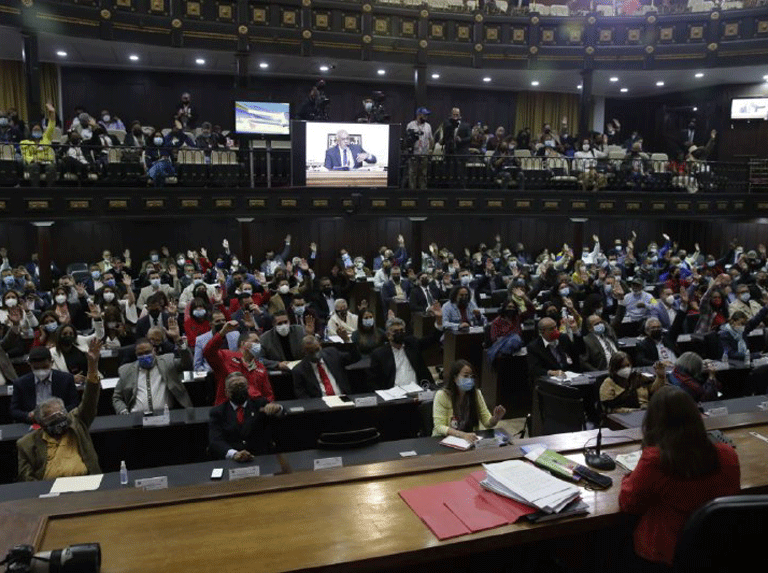Days after April 2, the Military Junta drew up a “Social Communication Plan for the Recovery of the Malvinas”, whose objective was to “neutralize” all negative information that affected the “political and military” objectives of the reconquest.
For the Military Junta, social control through propaganda was imperative because the recovery of the islands had been preceded by a growing dynamic of protests over the economic situation that reached its zenith in the march “Bread, Peace and Work”.
On March 30, the CGT led by Saúl Ubaldini called for a rally under that ecumenical slogan that overflowed the Plaza de Mayo with workers and citizens fed up with the military government.
The mobilization ended with repression and arrests but despite this, three days later, a crowd celebrated with the de facto president Leopoldo Galtieri the news that the Malvinas had been recovered.
In this context of social effervescence and increasingly bold demands from trade unionism, the Board developed a communication strategy that would outshine the protests and raise support for the war effort.
“The psychological maneuver implemented on the basis of false or distorted news would be achieving partial success, since a growing doubt is observed in some sectors about the timeliness of the Argentine recovery operation and about the material damage and lives that can be caused by an aggression by the Fleet english (sic),” said the plan prepared by the Board to which Télam had access.
Signed by Rear Admiral Salvio Olegario Menéndez -later sued by the Spanish justice system for crimes against humanity committed at the ESMA-, the plan assessed that “so far (April 8) the attitude of the country’s private media, although it is full support for the policies and actions of the National Government, is concerned about the prominent spaces it dedicates to alarmist information from Europe”.
Due to this “concern” about the coverage of the conflict, the de facto administration proposed that “the Joint Chiefs of Staff (head of the Armed Forces), in coordination with the Ministry of Public Information, will centralize, plan and develop an intense action of social communication in order to support the political and military objectives of the Junta”.
Basically, the head of military intelligence and former deputy director of the ESMA proposed “neutralize all negative information that comes from abroad through a harmonious task of social communication.”
“All the programs to be broadcast will be previously recorded and their total or partial diffusion will be authorized by the intervenors of the official media”Rear Admiral Menéndez sentenced
The “negative information” it was not only military, since the beginning of the decade the Central Bank had been losing reserves at alarming levels and the economic leadership made decisions that liquefied the wages of workers and savers.
One of those unpopular measures was the circular 1050 that the then Minister of Economy, José Martínez de Hoz, authorized for mortgage loans to be updated to market values, which melted thousands of savers and small merchants.
Notwithstanding the inequities that Argentines experienced in their daily economy, the Board assumed that “the psychological action on national public opinion can be executed in a centralized and directed manner, according to national needs in the armed or negotiating field.”
The Junta wanted the broadcasts from the front to show “aspects that highlight the normal life of the islands” and the “achievements” of the Argentine forces.
With this logic of limits to expression, days before April 2, the Board had banned the films “El pueblo contra Alice Cooper” and “Pixote”, by Argentine Héctor Babenco, which dealt with a child who struggled to survive poverty. and marginality in Brazil.
“All the programs to be broadcast will be previously recorded and their total or partial broadcast authorized by the official media controllers,” said Rear Admiral Menéndez within that censorship strategy.
This media control plan was released a week after the Argentine landing in Puerto Argentino, when the United Kingdom was making its military preparations, and the battles that defined the conflict were still far away.
It was clear to the military at that time that they would not allow foreign correspondents to enter the islands, “especially news agencies,” which, due to their global broadcasting capacity, could complicate social support.
The Board understood that leading the communication of the conflict was a “necessity” to avoid “the spread of alarmist news from abroad” but it contemplated exceptions when the eventual news was “approved by the media controller and is presented with a comment that minimizes or neutralizes it.”
The recovery of the islands had the objective of retaking, through a historical longing, the political initiative lost at the hands of the “Multiparty”, which brought together the main political parties, and the combative union leaders.
The military detected that their power had been diminishing and that of civil society increasing, and they knew that this dynamic would not lead to anything good if they did not recover the initiative and governability; It was then that they dusted off the old project of recovering the Malvinas by force.
Colonel de Piano, comptroller in Chubut, repressor in Bahía Blanca and director of Télam
The military comptroller of the Télam agency during the South Atlantic conflict, Raphael Benjamin of Pianoalso de facto comptroller of the province of Chubut, he was prosecuted in 2007 for crimes against humanity committed while he was chief of operations of the V Army Corps in Bahía Blanca.
At dawn on March 24, 1976, the then Colonel de Piano swore by God and Country as military comptroller of Chubut, inside the government house that combined Army and Navy forces had taken by force hours before.
According to the chronicles of the time, de Piano was sworn in before the Government Notary General, Francisco Gómez, and in front of several civilians, including Néstor González, private secretary of the ousted governor Benito Fernández.
De Piano was then 50 years old and had a successful career in the Army: graduated from the Military College as an Artillery Second Lieutenant, he was then assigned to the 2nd Blue Artillery Regiment and specialized in armored vehicles.
At the end of 1972, already as an officer of the General Staff, he was promoted to colonel and appointed as second Commander of the IX Infantry Brigade in Comodoro Rivadavia, which would mean that he would be entrusted with the military intervention of the province with the coup of 1976.
A year later, he was appointed Chief of Operations of the V Army Corps, in Bahía Blanca, and in February 1978 the de facto president himself, Jorge Rafael Videla, promoted him as General Secretary of the ephemeral Ministry of Planning, created by the military. to deal with public works.
Colonel de Piano arrived in Télam in 1978, also assigned by the dictator Videla, and remained there until three months before the restoration of democracy in 1983.
His management was the one that acquired the building that the agency still has in Bolivar at 500, in the Buenos Aires neighborhood of Montserrat, and that was clouded by the sale of photos of Télam’s envoys to the Malvinas.
Piano himself confessed on May 5, 1982, before the Rattenbach Commission that investigated the responsibilities in Malvinas, that the photos obtained by the agency’s photojournalists were sold “for 500 and 1,000 dollars” in a kind of black market that was he had set up in the lobby of the Sheraton Hotel, which was where the foreign correspondents stayed.
The circuit of the photos contemplated that the image approved on the island was sent by plane to Comodoro, from there to Buenos Aires also by air directly to the Joint Chiefs of Staff who, after “evaluating” them, transferred them to Télam for dissemination.
De Piano disclaimed his responsibilities for this illicit sale, but accepted that at some point in the transfer, the images were stolen to be sold to international agencies.
In 2007, justice claimed de Piano for crimes against humanity perpetrated while he served as chief of operations of the V Army Corps, in Bahía Blanca.
After the repeal of the Full Stop and Due Obedience laws, the proceedings against the repressors of the V Corps were reopened, including Piano, who signed a statement published in La Nueva Provincia reporting the death of four alleged guerrillas in a forged confrontation.
-
Coverage for you and your family group in PAMI
-
If you need psychological assistance, call 139
-
For psychiatric emergencies call 138, option 7
- • More info at War Veterans Centers












